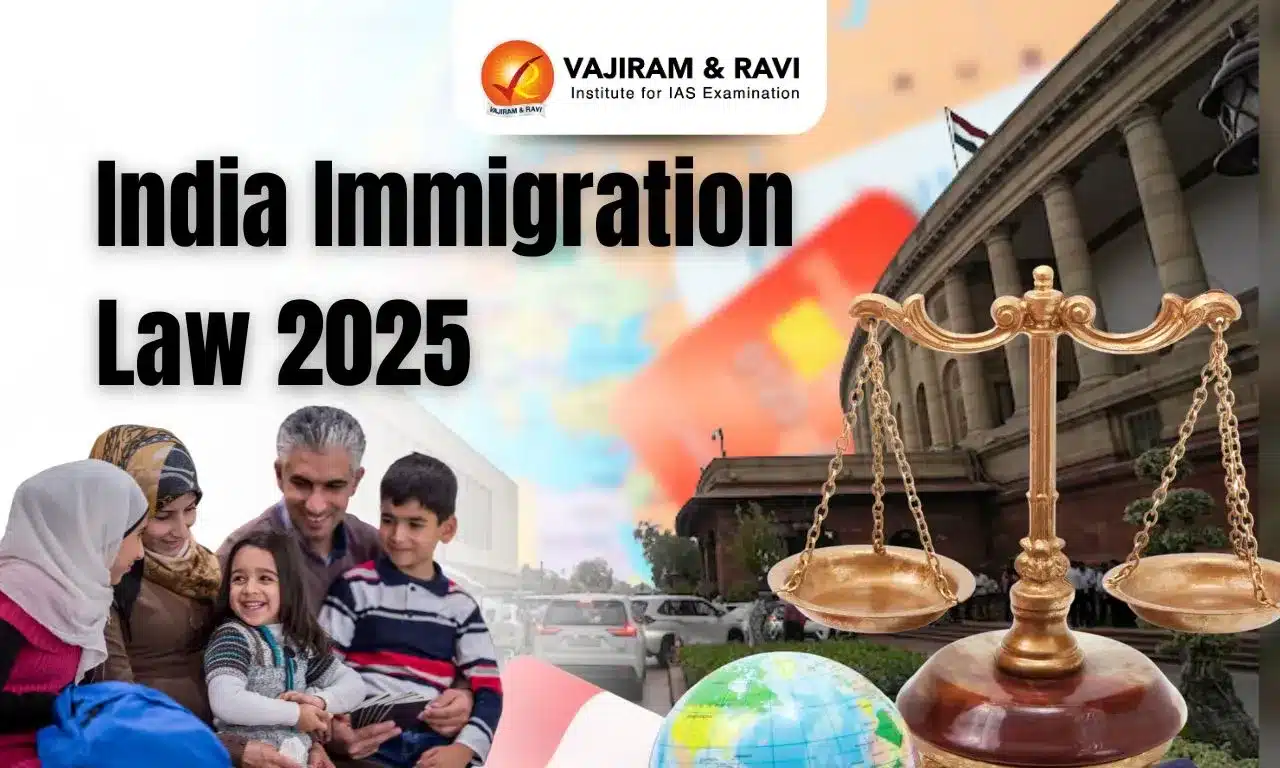What’s in Today’s Article?
- Immigration and Foreigners Bill Latest News
- Introduction
- Key Features of the Immigration and Foreigners Bill, 2025
- Need for the New Law
- Potential Challenges and Criticism
- Conclusion
- India’s Immigration and Foreigners Bill, 2025 FAQs
Immigration and Foreigners Bill Latest News
- The Immigration and Foreigners Bill, 2025, is likely to be introduced by Union Home Minister Amit Shah in the ongoing Budget session of Parliament.
Introduction
- The Immigration and Foreigners Bill, 2025, is expected to be introduced by Union Home Minister Amit Shah during the ongoing Budget session of Parliament.
- The proposed legislation aims to streamline immigration laws, bringing them in line with modern security needs and regulatory requirements. It will replace outdated laws such as:
- The Passport (Entry into India) Act, 1920
- The Registration of Foreigners Act, 1939
- The Foreigners Act, 1946
- The Immigration (Carriers’ Liability) Act, 2000
- The proposed legislation aims to streamline immigration laws, bringing them in line with modern security needs and regulatory requirements. It will replace outdated laws such as:
- The Bill introduces stricter penalties, clearer regulations for educational and medical institutions, and a more defined framework for foreigner registration, visa issuance, and deportation procedures.
Key Features of the Immigration and Foreigners Bill, 2025
- Stricter Penalties for Violations
- The Bill proposes hefty fines and stricter enforcement mechanisms for violations of immigration laws:
- Unauthorised entry into India: Penalty up to ₹5 lakh.
- Use of fake passports: Fine up to ₹10 lakh.
- These penalties aim to deter illegal immigration and document fraud, ensuring better compliance with entry and exit regulations.
- Clearer Regulations for Universities and Medical Institutions
- The Bill explicitly defines the roles and responsibilities of universities, hospitals, and medical institutions that admit foreign nationals:
- Educational institutions must register foreign students and report them to authorities.
- Hospitals and medical institutions admitting foreign nationals will have legal obligations to maintain records.
- This provision ensures better tracking of foreigners in India and prevents misuse of visas.
- Revised Visa and Passport Rules
- The Bill grants the Central Government greater control over visa regulations, passport requirements, and foreigner registration. Key changes include:
- Stricter requirements for obtaining Indian visas.
- Enhanced scrutiny of foreigners residing in India.
- Improved tracking mechanisms for visitors and long-term foreign residents.
- This is intended to tighten border security and improve monitoring of foreigners staying in India.
- The Bill grants the Central Government greater control over visa regulations, passport requirements, and foreigner registration. Key changes include:
- More Power to Immigration Officers
- Under the new law, immigration officers will have:
- Greater authority to detain, investigate, and deport illegal immigrants.
- The power to control movements of restricted foreigners.
- The right to deny entry based on security risks.
- This will strengthen India’s border security and internal monitoring system.
- Liability of Carriers and Transport Operators
- The Bill includes provisions holding transport operators responsible for carrying unauthorized foreigners into India:
- Airlines, shipping companies, and transport agencies must verify passenger documents before boarding.
- Carriers found in violation will face legal penalties.
- This ensures better enforcement of international travel norms and prevents illegal entry into India.
Need for the New Law
- The existing laws on immigration and foreigners are outdated, dating back to the pre-Independence era (1920-1946). These laws were framed during wartime conditions and are no longer suitable for India’s current security and immigration challenges.
- The Foreigners Act, 1946, and the Registration of Foreigners Act, 1939, were originally enacted during World War II to regulate wartime movements.
- The Immigration (Carriers’ Liability) Act, 2000, was introduced to hold airlines accountable for bringing undocumented passengers into India.
- However, due to technological advancements, evolving security threats, and increasing global migration, the government believes that a single, comprehensive law is needed to effectively manage immigration.
Potential Challenges and Criticism
- Concerns Over Human Rights and Deportation Policies
- The law could lead to stricter deportation policies, affecting long-term foreign residents and asylum seekers.
- Human rights activists may raise concerns about due process and treatment of deported individuals.
- Impact on Universities and Medical Institutions
- Educational institutions and hospitals may find it difficult to comply with the new reporting requirements for foreign nationals.
- There may be concerns regarding bureaucratic hurdles in admitting international students and medical tourists.
- Enforcement and Implementation Issues
- Effective implementation will require strong coordination between immigration officers, airlines, universities, and security agencies.
- The government must ensure transparency in enforcement to prevent harassment or wrongful detentions.
Conclusion
- The Immigration and Foreigners Bill, 2025, is a major legislative reform aimed at modernizing India’s immigration system, strengthening border security, and improving foreigner regulation.
- By replacing outdated laws with a single, comprehensive act, the government aims to streamline visa policies, increase penalties for violations, and enforce stricter control over foreigner registration.
- However, successful implementation will require careful balancing of security concerns with human rights, ensuring that legitimate travellers, students, and expatriates do not face unnecessary bureaucratic obstacles.
- As the Parliament debates the Bill, it will be crucial to address concerns from stakeholders, educational institutions, and civil rights groups to create a fair yet effective immigration framework.
India’s Immigration and Foreigners Bill, 2025 FAQs
Q1. What is the purpose of the Immigration and Foreigners Bill, 2025?
Ans. The Bill aims to modernize India’s immigration laws, enhance border security, and regulate visas, passports, and foreigner registration.
Q2. What are the key penalties under the new immigration law?
Ans. Unauthorized entry can result in a fine up to ₹5 lakh, while using fake passports may lead to a penalty up to ₹10 lakh.
Q3. How does the Bill impact universities and hospitals?
Ans. Educational institutions and medical facilities must register and track foreign nationals they admit, ensuring better regulation of foreigner movements in India.
Q4. What new powers are given to immigration officers?
Ans. Immigration officers can detain, investigate, and deport illegal immigrants, and restrict movements of foreigners under specific conditions.
Q5. Why is the government replacing old immigration laws?
Ans. The current laws date back to 1920-1946, making them outdated. The new Bill aims to streamline immigration procedures and improve security in a globalized world.
Source: IE
Last updated on June, 2025
→ UPSC Notification 2025 was released on 22nd January 2025.
→ UPSC Prelims Result 2025 is out now for the CSE held on 25 May 2025.
→ UPSC Prelims Question Paper 2025 and Unofficial Prelims Answer Key 2025 are available now.
→ UPSC Calendar 2026 is released on 15th May, 2025.
→ The UPSC Vacancy 2025 were released 1129, out of which 979 were for UPSC CSE and remaining 150 are for UPSC IFoS.
→ UPSC Mains 2025 will be conducted on 22nd August 2025.
→ UPSC Prelims 2026 will be conducted on 24th May, 2026 & UPSC Mains 2026 will be conducted on 21st August 2026.
→ The UPSC Selection Process is of 3 stages-Prelims, Mains and Interview.
→ UPSC Result 2024 is released with latest UPSC Marksheet 2024. Check Now!
→ UPSC Toppers List 2024 is released now. Shakti Dubey is UPSC AIR 1 2024 Topper.
→ Also check Best IAS Coaching in Delhi
























